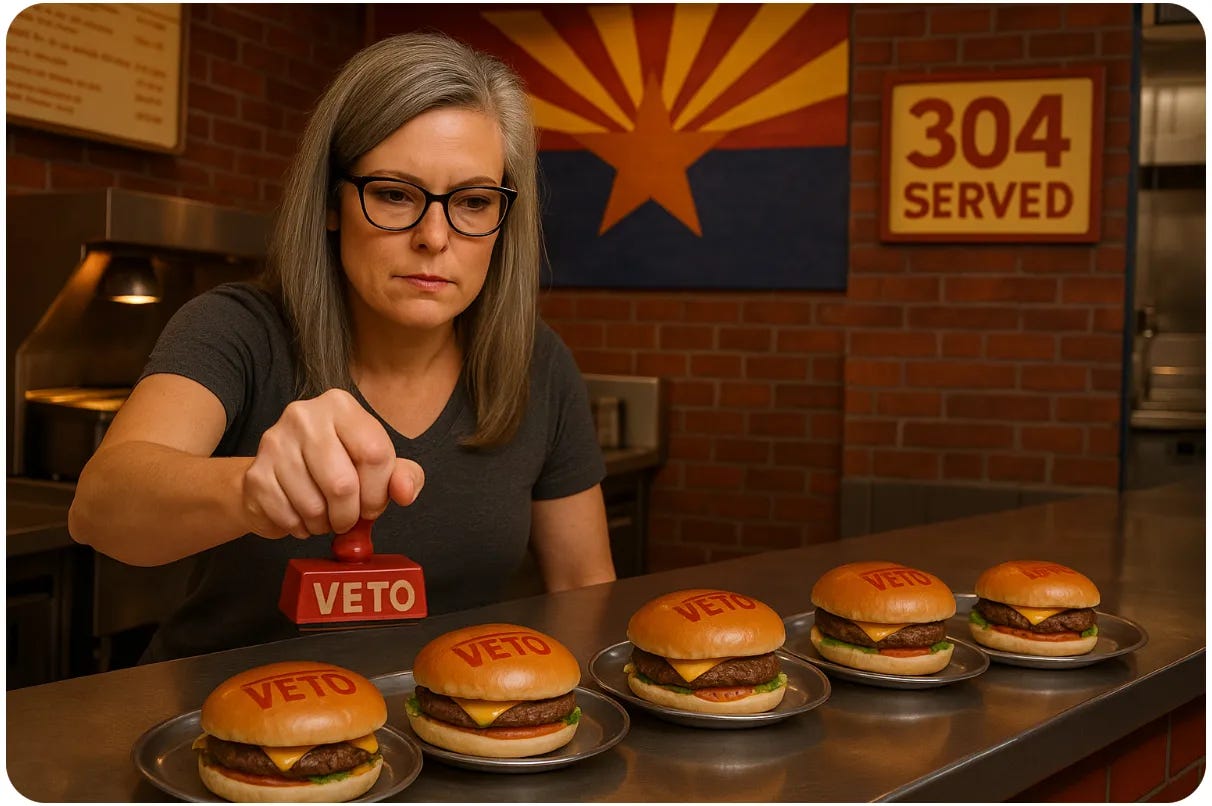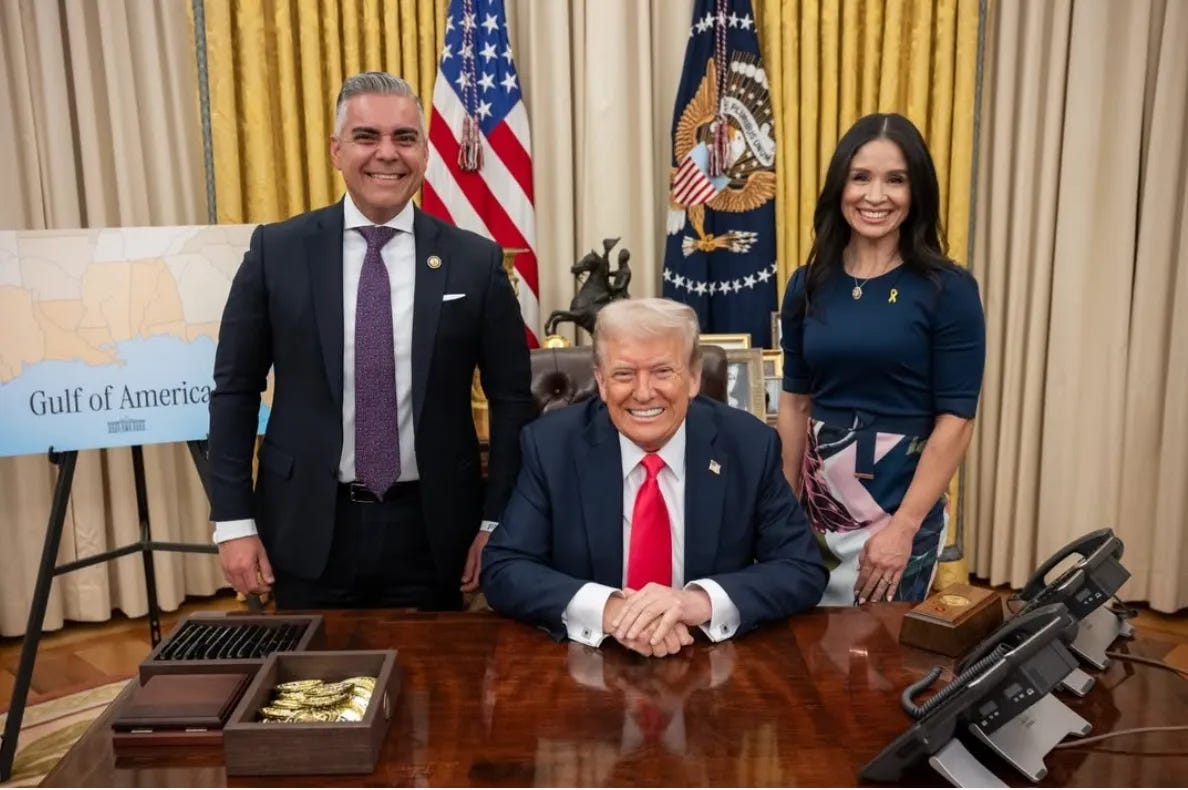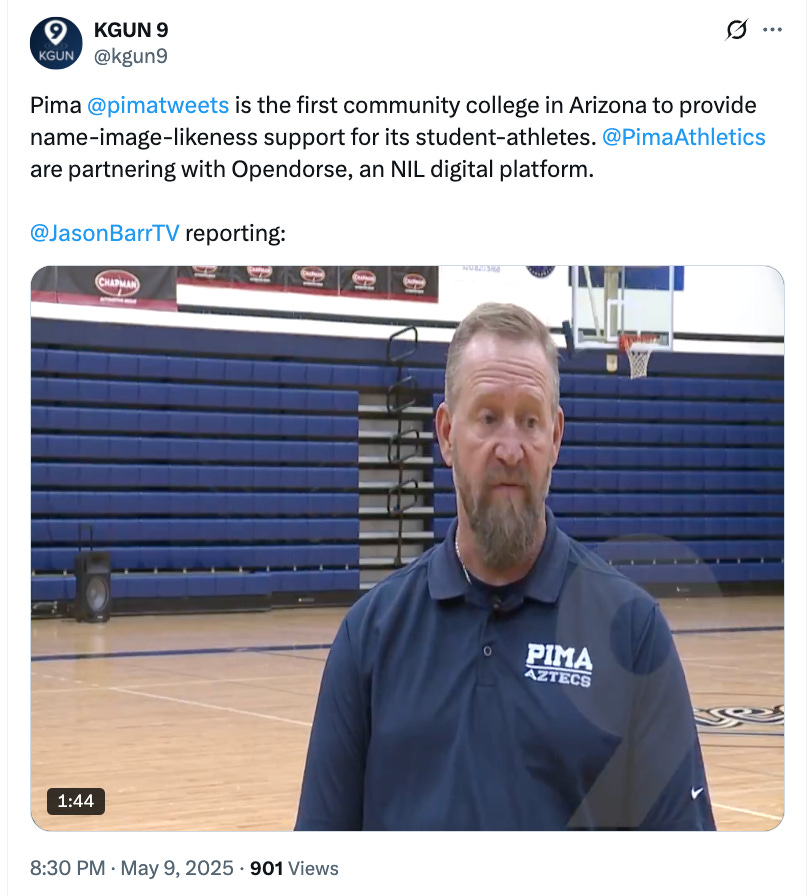The governor’s empty desk
New laws on the books … Encampments, piggy banks, river rivals … And catering to young men is tricky.
The governor’s desk is finally clear. At least for the moment.
In the past few weeks, Gov. Katie Hobbs has dealt with more than 200 bills that lawmakers have sent her way — and the ratio of bills vetoed has been climbing.
The Democratic governor is on track to break the state’s record for number of bills vetoed in a single year, a record Hobbs set back in 2023 with 143 vetoes. (She’s at 138 vetoes so far this year.)
And she’s already signed 214 bills into law, which amounts to roughly two-thirds of the new laws that generally come out of each legislative session.
While Hobbs was busy clearing out the pile of bills on her desk, lawmakers took a spring break this week, which means it’s a good time to check in on which of the new laws will affect Tucsonans, and which bullets they dodged.

Hobbs vetoed an additional 50 bills since our sister newsletter, the Arizona Agenda, and their art intern, ChatGPT, created this image last week. Her all-time number of vetoes served now stands at 354.New rules
University of Arizona students can still protest on campus, but they can no longer put up tents or any other sort of encampment. Hobbs signed a bill from Tucson Democratic Rep. Alma Hernandez that made it a state crime to set up tent cities, like UA students did last year to support Palestine.
You’ll probably start seeing “Turquoise alerts” pop up on your phone. They’re meant to spread the word when an Indigenous person is missing, akin to the Amber Alerts for missing children. The new alert memorializes the life of San Carlos Apache Tribal member Emily Pike.
Utility companies are off the hook, sort of, if their power lines or transformers start wildfires. Utilities in California, Colorado and Oregon have faced major lawsuits in the past after it was determined that their equipment started wildfires. The new Arizona law would give utilities cover, provided they have a plan for when their equipment sparks wildfires.
UA student athletes will have the chance to get paid directly by the university, instead of having to drum up endorsement deals. Hobbs signed a bill to help Arizona universities and community colleges compete for athletes with schools in other states.
As the summer temperatures rise, get ready for construction noise to start a little earlier in the morning. A new law allows crews to start work at 5 a.m. during summer months, instead of the 6 a.m. start time set by the City of Tucson. That might be a little annoying, but the goal of the bill is to help construction workers avoid heat-related illness during the hottest part of the day.
Politicians have new rules for how they report campaign finances. The new law will require elected officials to file quarterly reports the whole time they’re in office, not just the year before an election. And it goes into effect before the next reporting deadline, so we should have a lot of new campaign reports to read on July 15.
The governor also criminalized the use of AI to generate fraudulent voice recordings with the intent to defraud or harass another person. AI voice mimicking has gotten so convincing that scammers are having a field day with the technology.
Veto stamped
Tucson teachers can still call it the Gulf of Mexico. After President Donald Trump issued an executive order changing the name to the “Gulf of America,” GOP lawmakers in Arizona passed a bill to require teachers to adopt the new name. But Hobbs vetoed it, saying lawmakers should “refocus your time and energy on solving real problems for Arizonans.”

Tucson Congressman Juan Ciscomani and his wife Laura Ciscomani pose with Trump and a map of the “Gulf of America.”And college students in Tucson can still learn about diversity, equity and inclusion. GOP lawmakers passed a bill to block DEI in schools, or risk losing state funding. But Hobbs vetoed it, saying the bill “lacks clarity” and would jeopardize state funding for schools. However, there’s still the threat of federal action that schools have to deal with.
Local hospitals won’t be forced to check the immigration status of patients. GOP lawmakers pushed the bill through the Legislature on party lines, but Hobbs vetoed it, saying business leaders and hospitals opposed the bill.
Hotel owners won’t have to put up signs warning that homeless people are staying there. Local officials like the Tucson City Council sometimes use hotels to give people temporary shelter. GOP lawmakers wanted hotel owners to make sure any other guests knew whether homeless people were staying at the hotel. Hobbs vetoed it, saying state officials shouldn’t “micromanage local businesses who have stepped-up to help address our state’s housing challenges.”
Hobbs also shot down a bill to give lawmakers the power to issue subpoenas that sheriffs could enforce. In her veto letter, Hobbs said the legislation “weaponizes the power of the Legislature in a way that could be used to intimidate Arizonans.”
The state budget
The big one hasn’t happened yet. Lawmakers and Hobbs haven’t agreed on a state budget.
Whatever agreement they strike will affect basically every service provided by the City of Tucson, Pima County and other local municipalities.
Most local officials haven’t hammered out their budgets yet, but it looks like at least Pima County is going to raise property taxes to make up for cost shifts from the state.
County supervisors would have had a harder time raising taxes if one bill had made it into law. It would have required a two-thirds majority for local officials to raise tax rates, which would mean four County Supervisors would have to agree, instead of just three.
What did we miss? Leave a comment and let us know which other new laws, or vetoed bills, should get highlighted.
And while you’re at it, don’t forget to subscribe!
The first month or two of the legislative session usually brings hundreds of bills that are designed to generate headlines, not necessarily make it into law.
It’s called “silly season” for a reason.
Here are some of the bills that grabbed headlines, but died without making it to the governor’s desk.
BYOB: A bill to let golfers bring their own beer or other alcohol onto golf courses.
Howdy!: A bill from freshman Tucson Democratic Rep. Kevin Volk would have made “Howdy!” the official state greeting.
Border bounties: A bill to give local police departments a $2,500 bounty for each immigrant they detained who was eventually deported.
Ending legislative immunity: After a series of lead-footed lawmakers, including former Tucson Republican Rep. Justine Wadsack, got ticketed and then claimed they had immunity, the Legislature considered a bill getting rid of the privilege entirely.
Behind the headlines about artificial intelligence taking over the world, the business model that holds up the whole thing is starting to falter.
A few high-profile court cases, several proposed laws and the sudden firing of a key official could make it a lot harder for tech billionaires to turn a profit — if they have to actually start paying for all the copyrighted material their AI systems are ingesting.
The all-you-can-eat buffet could be closing.
Artificial intelligence firms have a big appetite for data. They feed on books, music, print and anything else they can use as AI training data.
But that doesn’t sit well with the companies and people who create that material, particularly when they watch AI firms make huge amounts of cash, without sharing any of it.
AI firms claim the “Fair Use” doctrine allows them to use the material for free and without having to ask for permission. It’s the same doctrine that blessed things like Google Books’ search snippets.
But that arrangement is up in the air right now. And the sudden firing of a key player by the Trump administration just made the future for AI even more uncertain.
Check out this week’s edition of the A.I. Agenda to see what’s happening, and what the billionaire class has to say about it.
All eyes were on the University of Arizona campus last spring when student protesters set up encampments as they rallied to support Palestine.
A Tucson lawmaker didn’t take kindly to those protests and now there’s a new state law banning encampments on campuses.
If there’s one thing the Trump administration is good at, it’s generating protests.
And Arizona’s GOP-led Legislature and Democratic governor just made it easier to crack down on the student protesters who have become a prime target of President Donald Trump.
At this point, you might be thinking the new law came from a Republican legislator trying to crack down on liberal universities.
Nope. It came from a Tucson Democrat.
And the messy, months-long process of getting the bill to Gov. Katie Hobbs’ desk split the Democratic caucus, freaked out some Republicans, and left students without a clear idea of what exactly they’re not allowed to do.
This week’s edition of the Education Agenda has the legislative backstory and breaks down the free speech implications and potential unintended consequences of criminalizing campus protests.
Arizona is in the middle of high-stakes negotiations over the future of the Colorado River. So are six other states.
This week, we hopped to the other side of the negotiating table to look through the eyes of Coloradans.
When Arizona Gov. Katie Hobbs said in January that she wanted $3 million to pay for a legal battle over Colorado River water, officials in Colorado sat up and took notice.
Arizona’s announcement was all “posturing” and “saber rattling,” a lawyer told Northern Colorado’s KUNC. Arizona and the other Lower Basin states are “trying to make it very clear they are willing and open to litigate this issue because they think they have the higher hand.”
It was just one move in the decades-long chess game played by the seven states that use the Colorado River.
Dive into this week’s Water Agenda for a different perspective on the water wars, as the basin states gear up for another round of tough water dealmaking.
While Gov. Katie Hobbs signed a bill that requires adults to show their ID to view online porn in Arizona, Utah Republican U.S. Sen. Mike Lee last week introduced federal legislation that would go much further.
He wants to ban pornography altogether.
Arizona Congresswoman Yassamin Ansari tweeted that fighting for porn is her party’s opening to “win back young men.” But after the internet attacked her, she said she was kinda kidding, but also sorta serious.
And once again, Democrats are stuck trying to figure out if they believe in freedom, privacy, or just … not getting ratioed on Twitter.









Regarding political campaign finance rules and laws: who is responsible for enforcing these rules and laws and what are the consequences to politicians for not following the rules or obeying the laws?